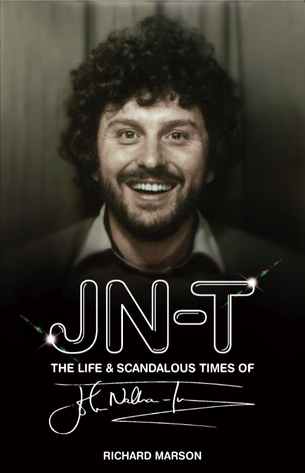Why you can trust GamesRadar+
A sex scandal splashed across the tabloids is the last thing Doctor Who needs in its 50th anniversary year, but that’s precisely what it’s liable to get once the seamier details of this book start spreading – especially in the wake of the Savile investigations.
JN-T (born simply John Turner – the double-barrelled surname was created to distinguish him from an actor of the same name) was Doctor Who ’s producer from 1980 until its cancellation in 1989. To say that he was a divisive figure would be an understatement. Many blame him for the demise of the show. Others credit him with revitalising the series and keeping it going for longer than might otherwise have been the case. As is usually the case, the truth lies somewhere in-between. This warts ‘n’ all biography lifts the stone on his time at the reins of the programme, and much of what it finds beneath is squirming unpleasantness.
It’s a safe bet that library copies will, in the future, fall open at chapter eight. Euphemistically titled “Hanky Panky” (after the well-worn phrase “There’s no hanky panky in the TARDIS”) it finally addresses head-on rumours that have circulated in fandom for many years, detailing how JN-T used his position of power to bed young fans. His long-term partner Gary Downie (also a production manager on Who ) was the procurer, scouting the conventions for (to use his charming phrase) “doable barkers”.
At one point, the author describes a personal encounter with Downie in a BBC lift which ended with him fleeing and hiding under a desk. Looking back now he can see the funny side, but the incident can only be categorised as sexual assault. Another jaw-dropping anecdote involves JN-T engaging in a sexual act in his office at the BBC (a sacking offence), then, with his trousers round his ankles, answering a phone call that turns out to be from Blue Peter editor Biddy Baxter. Sheesh.
The pattern pieced together from multiple sources is so troubling that Richard Marson feels compelled to address the elephant in the room. “Was John Nathan-Turner a paedophile?”, he asks. He concludes that there is no evidence that he was. Nathan-Turner and Downie may have made indecent propositions and (particularly in Downie’s case) pursued them forcefully. Their targets may also often have been under the homosexual age of consent at the time – 21 – but as Marson points out, that was an unjust law. It’s equally true that JN-T was not alone when it came to inappropriate behaviour - plenty of straight male BBC employees used their aura of celebrity to wow youthful conquests too. He doesn’t deserve to have additional opprobrium heaped on him simply because he was gay.

Lest you’re getting the wrong idea, JN-T isn’t just a catalogue of sexual accusations – far from it; “Hanky Panky”’s 24 pages take up just 6% of the book. Every detail of his time at the helm is picked over in explicit detail: how, desperate for adulation, he got too close to fandom, and ending up getting burned; how Who was cancelled, then reluctantly revived once BBC high-ups decided the ensuing outrage was “too much aggro”; how Colin Baker was sacked. We also learn about Nathan-Turner’s early days at school in Birmingham, the series of failed pitches he made after being made redundant, and his final, sad descent into alcoholism and liver disease.
Richard Marson – a reporter for Doctor Who Magazine in his youth, who went on to become the editor of Blue Peter – clearly has a crammed Rolodex. The roll-call of interviewees is extremely impressive, taking in three Doctors (Peter Davison, Colin Baker and Sylvester McCoy), seven companions, numerous script editors and directors, and the friends who knew Nathan-Turner best – including, surprisingly, an old girlfriend. The only key witness missing from this thoroughgoing trial is script editor Eric Saward, who infamously denounced JN-T in a 1986 issue of Starburst after a fall-out that ended in legal action – although we are treated to some colourful extracts from his resignation letter. Even Russell T Davies, normally reticent about commenting on his predecessors, pops up to provide his perspective, describing the Sixth Doctor’s costume as “the greatest mistake in the history of television”.
Neither is it a one-sided character assassination. JN-T is painted as paranoid, bullying, and clueless about storytelling, but there is plenty of compelling testimony to his better nature: it seems he was hard-working and efficient; charming, gregarious company; and could be extremely generous and caring. Some bitter enemies (most notably Tom Baker) buried the hatchet later on and became firm friends. The real bogeyman of the piece is his poisonous partner – a recurring theme is that “John was different when you got him on his own”. As “super-fan” Ian Levine puts it (with characteristic restraint…), “Gary was the black widow spider, spouting venom into his ear”.
Click on "Next" to read the second half of the review.

But it’s the details of the dark side of JN-T’s personality that, inevitably, linger in the memory – particularly the explosive blow-ups. Companion Nicola Bryant (Peri) recounts an incident at a convention in 1996 where, crazed by jealousy, he spat in her face . An apology and a reconciliation never came. She never spoke to Nathan-Turner again.
Perhaps just as shocking, in a different way, are the views of JN-T’s superior Jonathan Powell (then controller of BBC1), which are so brutally uncensored they may leave you gasping for breath. His answers drip with undisguised contempt for both the programme and his former employee. Asked why he didn’t move the producer to a different assignment, he says, “What was I going to do with fucking John Nathan-Turner? I didn’t want him doing anything else, because I didn’t think he was good enough. You didn’t want to give him stuff because you didn’t trust him. And the worse the programme got, the less you were going to trust him. I wanted him to fuck off and solve it – or die, really.”
It all adds up to the most scandalously frank book about the production of Doctor Who we've ever seen – or that we’re ever likely to see. Small press Miwk Publishing will no doubt cop some flack for taking it on – few fans want to see Doctor Who halo’s tarnished. But the truth will out eventually, and it seems unlikely that anyone could have done a better job of presenting it. Scrupulously researched, drawing on the BBC’s written archives, the producer’s own papers, and his secretary’s desk diaries, this is a book that strives for fairness and balance at every turn; whenever a contentious claim is made, Marson seeks out the counter-argument.
Yet it’s also a book one hesitates to recommend - you may feel this is one scab you’d prefer not to pick, one car crash you choose not to rubberneck at. There’s a great deal of bitterness, bile and bitching, much of it couched in industrial language. One person after another who worked on the show is skewered by fellow cast and crew as “despicable”, “ a prat”, “talentless”, “a hack”, “a con man”, “ineffectual”, “too pleased with himself”, or simply “a pain in the fucking arse”.
To actively enjoy it, you’ll probably need to share one characteristic with its subject – everyone who knew him agrees that Nathan-Turner was an incorrigible gossip. If you’re not the sort of person who enjoys hearing the dirt dished then you may feel that much of what the book covers is petty (particularly everything that relates to fan politics) or simply none of your business. Nevertheless, for anyone who was a card-carrying Doctor Who fan in the ‘80s, this is an essential read.
Ian Berriman twitter.com/ianberriman
Read our Doctor Who: The Aztecs – Special Edition review .
Read our Ice Warriors exclusive .
Read our Doctor Who: The Ark In Space – Special Edition review .
Read our Doctor Who: The Nameless City review .
Ian Berriman has been working for SFX – the world's leading sci-fi, fantasy and horror magazine – since March 2002. He's also a regular writer for Electronic Sound. Other publications he's contributed to include Total Film, When Saturday Comes, Retro Pop, Horrorville, and What DVD. A life-long Doctor Who fan, he's also a supporter of Hull City, and live-tweets along to BBC Four's Top Of The Pops repeats from his @TOTPFacts account.



